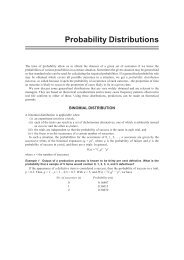International-Business-Dr-R-Chandran-E-book
International-Business-Dr-R-Chandran-E-book
International-Business-Dr-R-Chandran-E-book
You also want an ePaper? Increase the reach of your titles
YUMPU automatically turns print PDFs into web optimized ePapers that Google loves.
157<br />
<strong>International</strong> <strong>Business</strong>- <strong>Dr</strong>. R. <strong>Chandran</strong><br />
businesses, labour standards and basic freedom. A growing international<br />
movement is forming in protest against the WTO and its expanding ‘free<br />
trade’ agenda. Multilateral negotiations, known as ‘rounds’, held in Seattle<br />
and Doha. Qatar made the representation of developing countries stronger<br />
than before especially regarding issues related to agricultural subsidies and<br />
labour legislation. In many ways the advanced countries appear to have<br />
double standards. This approach has been challenged and the influence of<br />
the advanced countries in the WTO is gradually diminishing.<br />
Developments<br />
• The agenda of the WTO, the implementation of its agreements, and the<br />
much-praised dispute settlement system all serve to advance interests of<br />
developed countries, sidelining those of the developing countries.<br />
• The Least Developed Countries (LCDs) are marginalized in the world<br />
trade system, and their products continue to face tariff escalations.<br />
• Rules uniformly applied to WTO members have brought about<br />
inequalities because each member has different economic circumstances.<br />
Compared to GATT, the WTO is much more powerful because of its<br />
institutional foundation and its dispute settlement system. Countries that do<br />
not abide by its trade rules are taken to court.<br />
Historically, GATT enforced phased-in tariff reductions worldwide. Until<br />
the Uruguay Round, which ended in 1994, the trade negotiations focused on<br />
nonagricultural goods, mainly because the U.S. wanted to protect its farm<br />
sector. Over the years, as the corporate interests of the developed countries<br />
expanded, they also lobbied for more issues to be incorporated into the<br />
WTO.<br />
Changes in rules come about mainly through multilateral negotiations or<br />
“rounds”. Each round offers a package approach to trade negotiations, in<br />
which many issues are negotiated together and trade-offs between different<br />
issues are made. Between the rounds, negotiations on single issues take<br />
place.<br />
One of the commonly used yardsticks to measure the success of the WTO<br />
is the volume of world trade. The results seem excellent in this respect, with<br />
world trade up by 25% in the last four years. But the benefits of increased<br />
trade are not widely shared. For example, the LDCs represent 20% of the<br />
Only for Private Circulation





